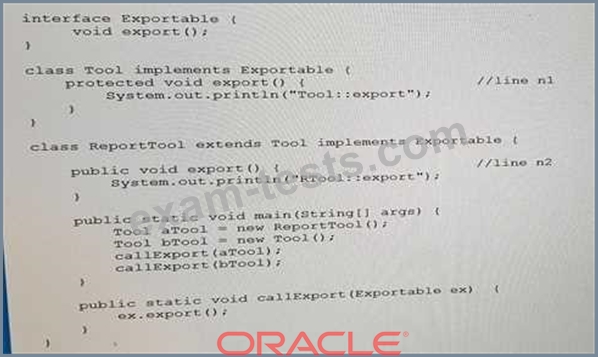Question 11
Given the code fragments:

What is the result?

What is the result?
Question 12
Given:

Your design requires that:
- fuelLevel of Engine must be greater than zero when the start() method is invoked.
- The code must terminate if fuelLevel of Engine is less than or equal to zero.
Which code fragment should be added at line n1 to express this invariant condition?

Your design requires that:
- fuelLevel of Engine must be greater than zero when the start() method is invoked.
- The code must terminate if fuelLevel of Engine is less than or equal to zero.
Which code fragment should be added at line n1 to express this invariant condition?
Question 13
Given the code fragment:

Which code fragment, when inserted at line 7, enables printing 100?

Which code fragment, when inserted at line 7, enables printing 100?
Question 14
Given the code fragment:
public static void main (String[] args) throws IOException {
BufferedReader brCopy = null;
try (BufferedReader br = new BufferedReader (new FileReader("employee.txt"))) { //
line n1
br.lines().forEach(c -> System.out.println(c));
brCopy = br;//line n2
}
brCopy.ready(); //line n3;
}
Assume that the ready method of the BufferedReader, when called on a closed BufferedReader, throws an
exception, and employee.txt is accessible and contains valid text.
What is the result?
public static void main (String[] args) throws IOException {
BufferedReader brCopy = null;
try (BufferedReader br = new BufferedReader (new FileReader("employee.txt"))) { //
line n1
br.lines().forEach(c -> System.out.println(c));
brCopy = br;//line n2
}
brCopy.ready(); //line n3;
}
Assume that the ready method of the BufferedReader, when called on a closed BufferedReader, throws an
exception, and employee.txt is accessible and contains valid text.
What is the result?
Question 15
Given:

and the code fragment:

What is the result?

and the code fragment:

What is the result?

